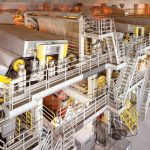As Indian manufacturers are making strides with new technologies, including automation, which enhances both efficiency and sustainability, Kuantum Papers uses Indian machinery across a wide range of operations. These machines, it says, are specifically designed to meet the demands of the Indian market, giving them an advantage in addressing local challenges. The Indian machinery offers a cost-effective and adaptable solution, supporting its commitment to economic development and environmental sustainability. ‘‘We also prioritize advanced features, particularly those that enhance automation, reduce waste and support our environmental sustainability goals,’’ Mr. Sushil Kumar Khetan, CEO – Operations informs Paper Mart in an exclusive interview.

Paper Mart: As a paper company, how would you rate the role played by the Indian pulp and paper equipment manufacturers in the industry?
Sushil Kumar Khetan: Guided by the vision of ‘Atmanirbhar Bharat’ and the transformative initiative of ‘Vocal for Local’, the Indian pulp and paper equipment manufacturers have made several strides in the last few years, propelling our industry forward. As India forges its path in the post-globalization era, these manufacturers play a vital role in our nation’s journey towards becoming a self-reliant economy. Their deep-rooted understanding of local market dynamics and resources empowers them to develop machinery that seamlessly aligns with our specific needs, enhancing efficiency and minimizing operational costs. The proximity of these manufacturers also enables faster service and after-sales support, which is crucial for ensuring smooth production and minimizing downtime. Moreover, our partnership with local manufacturers contributes to economic growth, fosters job creation and promotes skill development within the industry.
In an era where adaptability is essential, the role of Indian pulp and paper equipment manufacturers extends beyond support; they are fundamental in driving innovation and ensuring the resilience of our operations. Their contributions allow us to remain competitive on a global scale, positioning our company for sustained success and long-term growth in the industry.
Watch: In Pursuit of Lesser Water Footprint
PM: What Indian machinery do you use in your mill, and how do you rate them compared to those imported?
SKK: Kuantum Papers uses Indian machinery across a wide range of operations. For instance, in process machinery, we have acquired paper machine equipment, rewinders, pumps, motors, agitators and paper cutting and finishing machinery from Indian manufacturers. Additionally, advanced pulping equipment such as vertical and continuous digesters, washing systems, storage tanks and vessels are also locally sourced. Key utilities like boilers, turbines, electrical panels, transformers, air compressors, HVAC systems, steam and condensate systems, water treatment plants, effluent treatment plants and cooling towers are all locally procured, ensuring both dependability and quick service when needed.
While imported equipment may have specialized features in certain areas, Indian manufacturers are making strides with new technologies, including automation, which enhances both efficiency and sustainability. These machines are specifically designed to meet the demands of the Indian market, giving them an advantage in addressing local challenges. Overall, the Indian machinery offers a cost-effective and adaptable solution, supporting our commitment to economic development and environmental sustainability.
PM: What criteria are essentially considered when choosing a machine?
SKK: When selecting machinery for our mill, we evaluate several factors to ensure alignment with our operational and sustainability objectives. First and foremost, performance and efficiency are top priorities. We need machines that can handle our production demands and maintain high output levels. Cost is another major factor, and we carefully consider both the initial purchase price and long-term operating expenses like energy use and maintenance. Equally important is the quality of the machine’s output, ensuring the machine produces high-quality paper that consistently meets stringent specifications. We also prioritize advanced features, particularly those that enhance automation, reduce waste and support our environmental sustainability goals. Local service and support are major considerations as well, especially when it comes to minimizing downtime. Having easy access to spare parts and maintenance services ensures smoother operations. Last but not the least, compliance with local environmental and safety regulations is an important criterion of our decision-making process.
Also Read: Parason: Where Sustainability Meets Manufacturing Excellence
PM: Please elaborate some of the advantages and disadvantages of using Indian machinery in mills.
SKK: Using Indian machinery offers numerous benefits for our mill. One of the most significant benefits is cost-effectiveness, as local machines are generally more affordable compared to their imported counterparts. Local manufacturers also have a strong understanding of specific needs of the Indian market, allowing them to customize machinery that fits our production requirements. Proximity to manufacturers ensures faster after-sales service and easier access to spare parts, minimizing downtime and maintenance costs. Moreover, many are increasingly focused on eco-friendly technologies, supporting our commitment to sustainability.
On the downside, some Indian equipment may not have the advanced features or automation capabilities that imported machines offer. Even though local manufacturers are advancing, their research and development resources may not always come close to international brands, limiting technological innovation in certain cases. For highly specialized or large-scale tasks, imported machinery is often preferred due to its superior capabilities. While Indian machinery offers significant benefits, careful consideration is needed to ensure it meets both our operational needs and long-term sustainability goals.



